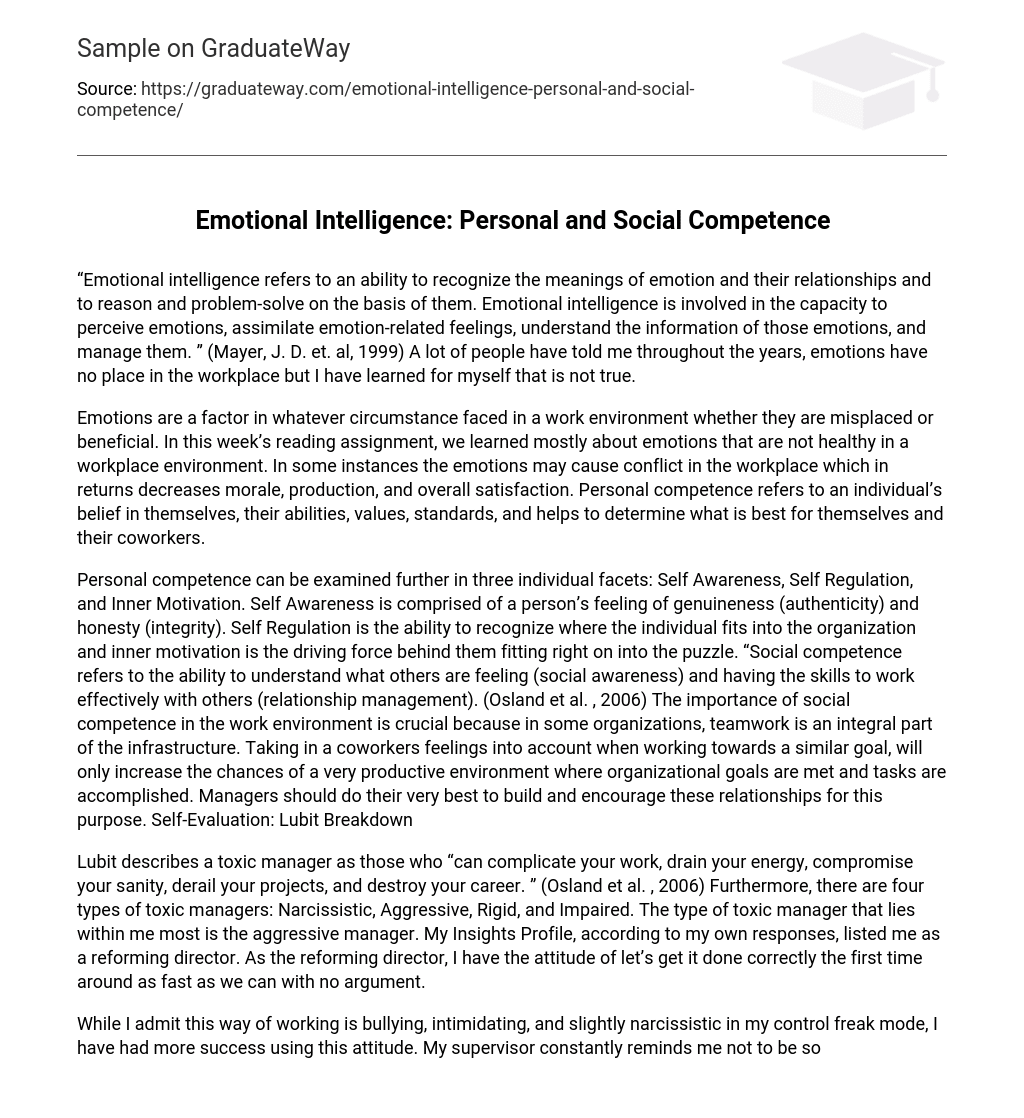“Emotional intelligence refers to an ability to recognize the meanings of emotion and their relationships and to reason and problem-solve on the basis of them. Emotional intelligence is involved in the capacity to perceive emotions, assimilate emotion-related feelings, understand the information of those emotions, and manage them. ” (Mayer, J. D. et. al, 1999) A lot of people have told me throughout the years, emotions have no place in the workplace but I have learned for myself that is not true.
Emotions are a factor in whatever circumstance faced in a work environment whether they are misplaced or beneficial. In this week’s reading assignment, we learned mostly about emotions that are not healthy in a workplace environment. In some instances the emotions may cause conflict in the workplace which in returns decreases morale, production, and overall satisfaction. Personal competence refers to an individual’s belief in themselves, their abilities, values, standards, and helps to determine what is best for themselves and their coworkers.
Personal competence can be examined further in three individual facets: Self Awareness, Self Regulation, and Inner Motivation. Self Awareness is comprised of a person’s feeling of genuineness (authenticity) and honesty (integrity). Self Regulation is the ability to recognize where the individual fits into the organization and inner motivation is the driving force behind them fitting right on into the puzzle. “Social competence refers to the ability to understand what others are feeling (social awareness) and having the skills to work effectively with others (relationship management). (Osland et al. , 2006) The importance of social competence in the work environment is crucial because in some organizations, teamwork is an integral part of the infrastructure. Taking in a coworkers feelings into account when working towards a similar goal, will only increase the chances of a very productive environment where organizational goals are met and tasks are accomplished. Managers should do their very best to build and encourage these relationships for this purpose. Self-Evaluation: Lubit Breakdown
Lubit describes a toxic manager as those who “can complicate your work, drain your energy, compromise your sanity, derail your projects, and destroy your career. ” (Osland et al. , 2006) Furthermore, there are four types of toxic managers: Narcissistic, Aggressive, Rigid, and Impaired. The type of toxic manager that lies within me most is the aggressive manager. My Insights Profile, according to my own responses, listed me as a reforming director. As the reforming director, I have the attitude of let’s get it done correctly the first time around as fast as we can with no argument.
While I admit this way of working is bullying, intimidating, and slightly narcissistic in my control freak mode, I have had more success using this attitude. My supervisor constantly reminds me not to be so ‘hard’ all of the time but unless I recognize it as being pushy, I don’t always see the problem with it, hence the reference of labeling myself as an aggressive manager. I am not this way all of the time however, if there is an important task at hand or we are closer to a deadline and time is being wasted on frivolous things, I kick my control freak mode on and we all get to work on the project until it is completed.
The thing that upsets the flow of our progress is when I am wrong about some aspect of the project or if I am absent and an important decision has to be made and it holds up progress. In that case, I usually receive emails or telephone calls at home for an answer. This is wrong because as a manager, I should have enough confidence in my team to select at least one individual to step up and make the decision in my absence. Conclusion Toxic managers can be very difficult to work with but the trick is being confident in ourselves and knowing how to handle the different types of these very challenging personalities.
We all have a toxic manager inside but under no circumstances should we demean and/or belittle an employee for self-gratification purposes. The individual employee can better tolerate the actions of a toxic manager by first learning how to appreciate, motivate, and manage their own emotions by building upon their social and personal competencies. (Bihm, 2010) By recognizing what triggers different emotional responses out of a toxic manager and also recognizing what the individual’s strengths and weaknesses are, a more stable work environment can be formed. Personally, I need to work on how not to micromanage and share responsibility with my subordinates.
REFERENCES
Bihm, Daya. (2010, March 5). What is Emotional Intelligence?. Retrieved June 21, 2011, from http://www. suite101. com/content/what-is-emotional-intelligence-a209654 Mayer, J. D. , Caruso, D. , & Salovey, P. (1999). Emotional intelligence meets traditional standards for an intelligence. Intelligence, 27, 267-298. Osland, J. S. , Turner, M. E. , Kolb, D. A. , & Rubin, I. M. (2006). The organizational behavior reader (8th ed. ). Prentice Hall





